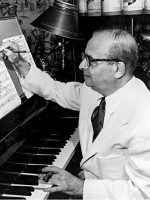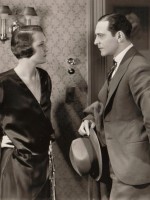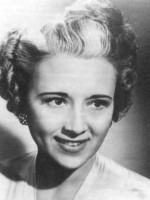Robert Benchley is a Actor, Scriptwriter, Title Designer and Additional Dialogue American born on 14 september 1889 at Worcester (USA)

Robert Charles Benchley (September 15, 1889 – November 21, 1945) was an American humorist best known for his work as a newspaper columnist and film actor. From his beginnings at the Harvard Lampoon while attending Harvard University, through his many years writing essays and articles for Vanity Fair and The New Yorker, and his acclaimed short films, Benchley's style of humor brought him respect and success during his life, from New York City and his peers at the Algonquin Round Table to contemporaries in the burgeoning film industry.
Benchley is best remembered for his contributions to The New Yorker, where his essays, whether topical or absurdist, influenced many modern humorists. He also made a name for himself in Hollywood, when his short film How to Sleep was a popular success and won Best Short Subject at the 1935 Academy Awards, and through his many memorable appearances in films such as Alfred Hitchcock's Foreign Correspondent and (in a dramatic turn) Nice Girl? His legacy includes written work and numerous short film appearances.
Robert's older brother, Edmund, was rushed to the Spanish–American War days after graduation from West Point (1898), and was a casualty almost immediately. The Benchley family were attending a public Fourth of July picnic when a bicycle messenger brought the notification telegram. In unthinking, stunned reaction, Maria Benchley cried out "Why couldn't it have been Robert?!", while the latter, who was nine years old, was standing by her side. Mrs. Benchley apologized profusely and tried hard to atone for the remark. Edmund's death had considerable effects on and unintended consequences for Robert's life, particularly in the form of Edmund's fiancee Lillian Duryea, a wealthy heiress. It is believed that Edmund's death in battle seeded pacifist leanings in Robert Benchley's writings. The period, however, was full of strong literary reactions to the Great War, and Benchley was aware of, for instance, the anti-war writings of A.A. Milne.
Robert Benchley met Gertrude Darling in high school in Worcester. They became engaged during his senior year at Harvard, and they married in June 1914. Their first child, Nathaniel Benchley, was born a year later. A second son, Robert Benchley, Jr., was born in 1919. Nathaniel became a writer himself, and penned a biography of his father in 1955. He was a well-respected fiction and children's book author. Nathaniel had talented sons as well: Peter Benchley was best known for the book Jaws (which inspired the film of the same name), and Nat Benchley wrote and performed in an acclaimed one-man production based on Robert's life.
Education
Robert grew up and attended school in Worcester and was involved in academic and traveling theatrical productions during high school. Thanks to financial aid from his late brother's fiancee, Lillian Duryea, he could attend Phillips Exeter Academy in Exeter, New Hampshire for his final year of high school. Benchley reveled in the atmosphere at the Academy, and he remained active in creative extracurricular activities, thereby damaging his academic credentials toward the end of his term.
Benchley enrolled at Harvard University in 1908, again with Duryea's financial help. He joined the Delta Upsilon fraternity in his first year, and continued to partake in the camaraderie that he had enjoyed at Phillips Exeter while still doing well in school. He did especially well in his English and government classes. His humor and style began to reveal themselves during this time: Benchley was often called upon to entertain his fraternity brothers, and his impressions of classmates and professors became very popular. His performances gave him some local fame, and most entertainment programs on campus and many off-campus meetings recruited Benchley's talents.
During his first two years at Harvard, Benchley worked with the Harvard Advocate and the Harvard Lampoon. He was elected to the Lampoon 's board of directors in his third year. The election of Benchley was unusual, as he was the publication's art editor and the board positions typically fell to the foremost writers on the staff. The Lampoon position opened a number of other doors for Benchley, and he was quickly nominated to the Signet Society meeting club as well as becoming the only undergraduate member of the Boston Papyrus Club at the time.
Along with his duties at the Lampoon, Benchley acted in a number of theatrical productions, including Hasty Pudding productions of The Crystal Gazer and Below Zero. He also held the position of κροκόδιλος for the Pudding in 1912. Benchley kept these achievements in mind as he began to contemplate a career for himself after college. Charles Townsend Copeland, an English professor, recommended that Benchley go into writing, and Benchley and future Benchley illustrator Gluyas Williams from the Lampoon considered going into freelance work writing and illustrating theatrical reviews. Another English professor recommended that Benchley speak with the Curtis Publishing Company; but Benchley was initially against the idea, and ultimately took a position at a civil service office in Philadelphia. Owing to an academic failure in his senior year due to an illness, Benchley would not receive his Bachelor of Arts from Harvard until the completion of his credits in 1913. His shortcoming was the submission of a "scholarly paper" – which Benchley eventually rectified by a treatise on the U.S. – Canadian Fisheries Dispute, written from the point of view of a cod. He took a position with Curtis shortly after he received his diploma.
Early professional career
Benchley did copy work for the Curtis Company during the summer following graduation, while doing other odd service jobs, such as translating French catalogs for the Boston Museum of Fine Arts. In September, he was hired by Curtis as a full-time staff member, preparing copy for its new house publication, Obiter Dicta. The first issue was roundly criticized by management, who felt it was "too technical, too scattering, and wholly lacking in punch" Things did not improve for Benchley and Obiter Dicta, and a failed practical joke at a company banquet further strained the relationship between Benchley and his superiors. He continued his attempts to develop his own voice within the publication, but Benchley and Curtis were not a good match, and he eventually left, as Curtis was considering eliminating Benchley's role and he had been offered a position in Boston with a better salary
Benchley held a number of similar jobs in the following years. His re-entry into public speaking followed the annual Harvard–Yale football game in 1914, where he presented a practical joke involving "Professor Soong" giving a question-and-answer session on football in Chinese. In what the local press dubbed "the Chinese professor caper," Soong was played by a Chinese-American who had lived in the United States for over thirty years, and pretended to answer questions in Chinese while Benchley "translated." While his public profile rose, Benchley continued with freelance work, which included his first paid piece for Vanity Fair in 1914, titled "Hints on Writing a Book," a parody of the non-fiction pieces then popular. While Benchley's pieces were bought by Vanity Fair from time to time, his consistent work dried up, and he took a position with the New York Tribune.
Benchley started at the Tribune as a reporter. He was a very poor one, unable to get statements from people quoted in other papers, and eventually had greater success covering lectures around the city. He was promised a position at the Tribune 's Sunday magazine when it launched, and he was moved to the magazine's staff soon after he was hired, eventually becoming chief writer. He wrote two articles a week: the first a review of non-literary books, the other a feature-style article about whatever he wanted. The liberty gave his work new life, and the success of his pieces in the magazine convinced his editors to give him a signed byline column in the Tribune proper.
Benchley filled in for P. G. Wodehouse at Vanity Fair at the beginning of 1916, reviewing theatre in New York. This inspired staff at the Tribune magazine to creativity for articles (such as arranging for the producers of The Thirteenth Chair to cast Benchley as a corpse), but the situation at the magazine deteriorated as the pacifist Benchley became unhappy with the Tribune 's position on World War I, and the Tribune editors were unhappy with the evolving tone and irreverence of the magazine. In 1917, the Tribune shut down the magazine, and Benchley was out of work again. When a rumored opening for an editorial position at Vanity Fair fell through, Benchley decided he would continue freelancing, having made a name for himself at the magazine.
This freelancing attempt did not start out well, with Benchley selling just one piece to Vanity Fair and accumulating countless rejections in two months. When a position as press agent for Broadway producer William A. Brady was offered, Benchley accepted it, against the advice of many of his peers. This experience was a poor one, as Brady was extremely difficult to work for. Benchley resigned to become a publicity director for the federal government's Aircraft Board at the beginning of 1918. His experience there was not much better, and when an opportunity was offered to return to the Tribune under new editorial management, Benchley took it.
At the Tribune, Benchley, along with new editor Ernest Gruening, was in charge of a twelve-page pictorial supplement titled the Tribune Graphic. The two were given a good deal of freedom, but Benchley's coverage of the war and focus on African-American regiments as well as provocative pictorials about lynching in the southern United States earned him and Gruening scrutiny from management. Amid accusations that both were pro-German (the United States was fighting Germany at the time), Benchley tendered his resignation in a terse letter, citing the lack of "rational proof that Dr. Gruening was guilty of...charges made against him..." and management's attempts to "smirch the character and the newspaper career of the first man in three years who has been able to make the Tribune look like a newspaper."
Benchley was forced to take a publicity position with the Liberty Loan program, and he continued to freelance until Collier's contacted him with an associate editor position. Benchley took this offer to Vanity Fair to see if they would match it, as he felt Vanity Fair was the better magazine, and Vanity Fair offered him the position of managing editor. He accepted and began work there in 1919.
An often overlooked influence upon Benchley's early professional career was the admiration and friendship of the Canadian economist, academic, and humorist Dr. Stephen Leacock. From Toronto Leacock closely followed the increasing body of Benchley's published humor and wit, and opened correspondence between them. He admitted to occasional borrowing of a Benchley topic for his own reflection and writings. Eventually, he began lobbying gently for Benchley to compile his columns into book form, and in 1922 was delighted with the result of his nagging. For his part – in a tribute to Leacock – Benchley later said he wrote everything Leacock ever wrote. They had a marvelous friendship.
Vanity Fair and its aftermath
Benchley began at Vanity Fair with fellow Harvard Lampoon and Hasty Pudding Theatricals alumnus Robert Emmet Sherwood and future friend and collaborator Dorothy Parker, who had taken over theatre criticism from P. G. Wodehouse years earlier. The format of Vanity Fair fit Benchley's style very well, allowing his columns to have a humorous tone, often as straight parodies. Benchley's work was typically published twice a month. Some of Benchley's columns, featuring a character he created, were attributed to his pseudonym Brighton Perry, but he took credit for most of them himself. Sherwood, Parker, and Benchley became close, often having long lunches at the Algonquin Hotel. When the editorial managers went on a European trip, the three took advantage of the situation, writing articles mocking the local theatre establishment and offering parodic commentary on a variety of topics, such as the effect of Canadian hockey on United States fashion. This worried Sherwood, as he felt it could jeopardize his forthcoming raise.
The situation at Vanity Fair deteriorated upon management's return. They sent out a memo forbidding the discussion of salaries in an attempt to rein in the staff. Benchley, Parker, and Sherwood responded with a memo of their own, followed by placards around their necks detailing their exact salaries for all to see. Management attempted to issue "tardy slips" for staff who were late. On one of these, Benchley wrote out, in very small handwriting, an elaborate excuse involving a herd of elephants on 44th Street. These issues contributed to a general deterioration of morale in the offices, culminating in Parker's termination, allegedly due to complaints by the producers of the plays she skewered in her theatrical reviews. Upon learning of her termination, Benchley tendered his own resignation. Word of it was published in Time by Alexander Woollcott, who was at a lunch with Benchley, Parker, and others. Given that Benchley had two children at the time of his resignation, Parker referred to it as "the greatest act of friendship I'd ever seen."
Following word of Benchley's resignation, freelance offers began piling up. He worked constantly while claiming he was intensely lazy. (According to legend, he submitted a magazine piece titled "I Like to Loaf" two weeks after deadline. His explanatory note: “I was loafing.”) He was offered $200 per basic subject article for The Home Sector, and a weekly freelance salary from New York World to write a book review column three times per week for the same salary he received at Vanity Fair. The column, titled "Books and Other Things," ran for one year and roved beyond literature to mundane topics such as Bricklaying in Modern Practice. Unfortunately for Benchley, however, his writing a syndicated column for David Lawrence drew the ire of his World bosses, and "Books and Other Things" was dropped.
Benchley continued to freelance, submitting humor columns to a variety of publications, including Life (where fellow humorist James Thurber stated that Benchley's columns were the only reason the magazine was read). He continued meeting with his friends at the Algonquin, and the group became popularly known as the Algonquin Round Table. In April 1920, Benchley landed a position with Life writing theatre reviews, which he would continue doing regularly through 1929, eventually taking complete control of the drama section. His reviews were known for their flair, and he often used them as a soapbox for issues of concern to him, whether petty (people who cough during plays) or more important (such as racial intolerance).
Things changed again for Benchley a number of years into the arrangement. A theatrical production by the members of the Round Table was put together in response to a challenge from actor J. M. Kerrigan, who was tired of the Table's complaints about the ongoing theatre season. The result, which played for one night April 30, 1922 at the 49th Street Theatre, was No Sirree! (the name being a pun of the European revue La Chauve-Souris), "An Anonymous Entertainment by the Vicious Circle of the Hotel Algonquin." Benchley's contribution to the program, "The Treasurer's Report," featured Benchley as a nervous, disorganized man attempting to summarize an organization's yearly expenses. The revue was applauded by both spectators and fellow actors, with Benchley's performance receiving the biggest laughs. A reprise of "The Treasurer's Report" was often requested for future events, and Irving Berlin hired Benchley for $500 a week to perform it nightly during Berlin's Music Box Revue which opened in September 1921 and ran until September 1922.
Hollywood and The New Yorker call
Benchley had continued to receive positive responses from his performing, and in 1925 he accepted a standing invitation from film producer Jesse L. Lasky for a six-week term writing screenplays at $500. While the session did not yield significant results, Benchley did get writing credit for producing the title cards on the Raymond Griffith silent film You'd Be Surprised (released September 1926), and was invited to do some titling for two other films.
Benchley was also hired to help with the book for a Broadway musical, Smarty, starring Fred Astaire. This experience was not as positive, and most of Benchley's contributions were excised and the final product, Funny Face, did not have Benchley's name attached. Worn down, Benchley moved to his next commitment, an attempt at a talkie version of "The Treasurer's Report". The filming went by quickly, and though he was convinced he was not good, The Treasurer's Report was a financial and critical success upon its release in 1928. Benchley participated in two more films that year: a second talking film he wrote, The Sex Life of the Polyp, and a third starring but not written by him, The Spellbinder, all made in the Fox Movietone sound-on-film system and released by Fox Films. The films enjoyed similar success and were critically acclaimed, and Benchley was signed to a deal to produce more films before heading back to New York to continue writing. As Life would say following his eventual resignation in 1929, "Mr. Benchley has left Dramatic Criticism for the Talking Movies".
During the time that Benchley was filming various short films, he also began working at The New Yorker, which had started in February 1925 under the control of Benchley's friend Harold Ross. While Benchley, along with many of his Algonquin acquaintances, was wary of getting involved with another publication for various reasons, he completed some freelance work for The New Yorker over the first few years, and was later invited to be newspaper critic. Benchley initially wrote the column under the pseudonym Guy Fawkes (the lead conspirator in the English Gunpowder Plot), and the column was well received. Benchley tackled issues ranging from careless reporting to European fascism, and the publication flourished. He was invited to be theatre critic for The New Yorker in 1929, leaving Life, and contributions from Woollcott and Parker became regular features in the magazine. The New Yorker published an average of forty-eight Benchley columns per year during the early 1930s.
With the emergence of The New Yorker, Benchley was able to stay away from Hollywood work for a number of years. In 1931, he was persuaded to do voice work for RKO Radio Pictures for a film that would eventually be titled Sky Devils, and he acted in his first feature film, The Sport Parade (1932) with Joel McCrea. The work on The Sport Parade caused Benchley to miss the fall theatre openings, which embarrassed him (even if the relative success of The Sport Parade was often credited to Benchley's role), but the lure of filmmaking did not disappear, since RKO offered him a writing and acting contract for the following year for more money than he was making writing for The New Yorker.
Benchley on film and "How to Sleep"
Benchley re-entered Hollywood at the height of the Great Depression and the large-scale introduction of the talkie films he had begun working with years before. His arrival put him on the scene of a number of productions almost instantly. While Benchley was more interested in writing than acting, one of his more important roles as an actor was as a salesman in Rafter Romance, and his work attracted the interest of MGM, who offered Benchley a lot of money to complete a series of short films. Benchley, who had also been offered a syndicated column by Hearst, was able to film the shorts in New York and keep up with his new column. Before heading back to New York, Benchley took a role in the feature film Dancing Lady, which also featured Joan Crawford, Clark Gable, Fred Astaire, Nelson Eddy, and the Three Stooges.
In 1933, Benchley returned to Hollywood, completing the short films Your Technocracy and Mine for Universal Pictures, How to Break 90 at Croquet for RKO, and the lavish feature-length production China Seas for Metro-Goldwyn-Mayer, starring Clark Gable, Jean Harlow, Wallace Beery, and Rosalind Russell; Benchley's character was slurring drunk throughout the movie. Upon completion, MGM invited Benchley to write and perform in a short production inspired by a Mellon Institute study on sleep commissioned by the Simmons Mattress Company. The resulting film, How to Sleep, was filmed in two days, and featured Benchley as both the narrator and sleeper, the latter a role Benchley claimed was "not much of a strain, as [he] was in bed most of the time." The film was well received in preview screenings, and promotions took over, with a still from the film being used in Simmons advertisements. The only group not pleased was the Mellon Institute, who did not approve of the studio mocking their study.
This was followed in 1936 by How to be a Detective. The early success of How to Sleep prompted MGM to rush two more short films featuring Benchley, How to Train a Dog, a spoof of dog-training techniques, and How to Behave, which lampooned etiquette norms. How to Sleep was named Best Short Subject at the 1935 Academy Awards, while the latter two shorts were not as well received.
Benchley returned to the cinema in 1937, cast in the revue Broadway Melody of 1938, and in his largest role to that point, the critically panned Live, Love and Learn. A short that Benchley completed for MGM, A Night at the Movies, was Benchley's greatest success since How to Sleep, and won him a contract for more short films that would be produced in New York. These films were produced more quickly than his previous efforts (while How to Sleep needed two days, the later short How to Vote needed less than twelve hours), and took their toll on Benchley. He still completed two shoots in one day (one of which was The Courtship of the Newt), but rested for a while following the 1937 schedule.
Benchley's return yielded two more short films, and his high profile prompted negotiations for sponsorship of a Benchley radio program and numerous appearances on television shows, including the first television entertainment program ever broadcast, an untitled test program using an experimental antenna on the Empire State Building. The radio program, Melody and Madness, was more a showcase for Benchley's acting, as he did not participate in writing it. It was not well received, and was removed from the schedule.
Later life
1939 was a bad year for Benchley's career. Besides the cancellation of his radio show, Benchley learned that MGM did not plan to renew his contract, and The New Yorker, frustrated with Benchley's film career taking precedence over his theatre column, appointed Wolcott Gibbs to take over in his stead. Following his final New Yorker column in 1940, Benchley signed with Paramount Pictures for another series of one-reel shorts, all filmed at Paramount's Long Island studio in Astoria, New York. Most of them were adapted from his old essays ("Take the Witness!," with Benchley fantasizing about conquering a tough cross-examination, was filmed as The Witness; "The Real Public Enemies," showing the criminal tendencies of sinister household objects, was filmed as Crime Control, etc.). In 1940 Benchley appeared in Alfred Hitchcock's Foreign Correspondent for which he is also credited as one of the dialogue writers. In 1941 Benchley received two more feature-length roles: Walt Disney's The Reluctant Dragon, in which Benchley tours the various departments of the Disney studio, and Nice Girl? with Deanna Durbin, noteworthy for a rare dramatic performance by Benchley.
Benchley's roles primarily came as a freelance actor, as his Paramount shorts contract didn't pay as well as feature films. Benchley was cast in minor roles for various romantic comedies, some shoots going better than others. He appeared in prominent roles with Fred Astaire in You'll Never Get Rich (1941) and The Sky's the Limit (1943). Paramount did not renew his contract in 1943, and Benchley signed back with MGM with an exclusive contract. The situation was not positive for Benchley, as the studio "mishandled" him and kept Benchley too busy to complete his own work. His contract concluded with only four short films completed and no chance of signing another contract. Following the printing of two books of his old New Yorker columns, Benchley gave up writing for good in 1943, signing one more contract with Paramount in December of that year.
While Benchley's books and Paramount contract were giving him financial security, he was still unhappy with the turn his career had taken. By 1944 he was taking thankless roles in the studio's least distinguished films, like the rustic musical National Barn Dance. By this time Robert Benchley's screen image was established as a comic lecturer who tried but failed to clarify any given topic. In this capacity Paramount cast him in the 1945 Bob Hope-Bing Crosby comedy Road to Utopia: Benchley interrupts the action periodically to "explain" the nonsensical storyline. On April 22, 1945, he guest starred on the Blue Network's (soon to be ABC) top-rated radio series The Andrews Sisters Show, sponsored by Nash motor cars & Kelvinator home appliances.
Benchley's drinking, already a problem, worsened and he was diagnosed with cirrhosis of the liver. (Ironically, when younger, he had been an adamant teetotaler.) While he completed his year's work, his condition continued to deteriorate, and Benchley died in a New York hospital on November 21, 1945. His family opted for a private funeral service, and his body was cremated and interred in a family plot on the island of Nantucket.
Source : Wikidata
Robert Benchley

- Infos
- Photos
- Best films
- Family
- Characters
- Awards
Birth name Robert Charles Benchley
Nationality USA
Birth 14 september 1889 at Worcester (USA)
Death 21 november 1945 (at 56 years) at New York City (USA)
Nationality USA
Birth 14 september 1889 at Worcester (USA)
Death 21 november 1945 (at 56 years) at New York City (USA)
Benchley is best remembered for his contributions to The New Yorker, where his essays, whether topical or absurdist, influenced many modern humorists. He also made a name for himself in Hollywood, when his short film How to Sleep was a popular success and won Best Short Subject at the 1935 Academy Awards, and through his many memorable appearances in films such as Alfred Hitchcock's Foreign Correspondent and (in a dramatic turn) Nice Girl? His legacy includes written work and numerous short film appearances.
Biography
Although Benchley was known for misleading and fictional autobiographical statements about himself (at one point asserting that he wrote A Tale of Two Cities before being buried at Westminster Abbey), he actually was the great-grandchild of the founder of Benchley, Texas, Henry Wetherby Benchley, who was jailed for his help with the Underground Railroad. Robert Benchley was born on September 15, 1889 in Worcester, Massachusetts, to Charles and Maria Benchley.Robert's older brother, Edmund, was rushed to the Spanish–American War days after graduation from West Point (1898), and was a casualty almost immediately. The Benchley family were attending a public Fourth of July picnic when a bicycle messenger brought the notification telegram. In unthinking, stunned reaction, Maria Benchley cried out "Why couldn't it have been Robert?!", while the latter, who was nine years old, was standing by her side. Mrs. Benchley apologized profusely and tried hard to atone for the remark. Edmund's death had considerable effects on and unintended consequences for Robert's life, particularly in the form of Edmund's fiancee Lillian Duryea, a wealthy heiress. It is believed that Edmund's death in battle seeded pacifist leanings in Robert Benchley's writings. The period, however, was full of strong literary reactions to the Great War, and Benchley was aware of, for instance, the anti-war writings of A.A. Milne.
Robert Benchley met Gertrude Darling in high school in Worcester. They became engaged during his senior year at Harvard, and they married in June 1914. Their first child, Nathaniel Benchley, was born a year later. A second son, Robert Benchley, Jr., was born in 1919. Nathaniel became a writer himself, and penned a biography of his father in 1955. He was a well-respected fiction and children's book author. Nathaniel had talented sons as well: Peter Benchley was best known for the book Jaws (which inspired the film of the same name), and Nat Benchley wrote and performed in an acclaimed one-man production based on Robert's life.
Education
Robert grew up and attended school in Worcester and was involved in academic and traveling theatrical productions during high school. Thanks to financial aid from his late brother's fiancee, Lillian Duryea, he could attend Phillips Exeter Academy in Exeter, New Hampshire for his final year of high school. Benchley reveled in the atmosphere at the Academy, and he remained active in creative extracurricular activities, thereby damaging his academic credentials toward the end of his term.
Benchley enrolled at Harvard University in 1908, again with Duryea's financial help. He joined the Delta Upsilon fraternity in his first year, and continued to partake in the camaraderie that he had enjoyed at Phillips Exeter while still doing well in school. He did especially well in his English and government classes. His humor and style began to reveal themselves during this time: Benchley was often called upon to entertain his fraternity brothers, and his impressions of classmates and professors became very popular. His performances gave him some local fame, and most entertainment programs on campus and many off-campus meetings recruited Benchley's talents.
During his first two years at Harvard, Benchley worked with the Harvard Advocate and the Harvard Lampoon. He was elected to the Lampoon 's board of directors in his third year. The election of Benchley was unusual, as he was the publication's art editor and the board positions typically fell to the foremost writers on the staff. The Lampoon position opened a number of other doors for Benchley, and he was quickly nominated to the Signet Society meeting club as well as becoming the only undergraduate member of the Boston Papyrus Club at the time.
Along with his duties at the Lampoon, Benchley acted in a number of theatrical productions, including Hasty Pudding productions of The Crystal Gazer and Below Zero. He also held the position of κροκόδιλος for the Pudding in 1912. Benchley kept these achievements in mind as he began to contemplate a career for himself after college. Charles Townsend Copeland, an English professor, recommended that Benchley go into writing, and Benchley and future Benchley illustrator Gluyas Williams from the Lampoon considered going into freelance work writing and illustrating theatrical reviews. Another English professor recommended that Benchley speak with the Curtis Publishing Company; but Benchley was initially against the idea, and ultimately took a position at a civil service office in Philadelphia. Owing to an academic failure in his senior year due to an illness, Benchley would not receive his Bachelor of Arts from Harvard until the completion of his credits in 1913. His shortcoming was the submission of a "scholarly paper" – which Benchley eventually rectified by a treatise on the U.S. – Canadian Fisheries Dispute, written from the point of view of a cod. He took a position with Curtis shortly after he received his diploma.
Early professional career
Benchley did copy work for the Curtis Company during the summer following graduation, while doing other odd service jobs, such as translating French catalogs for the Boston Museum of Fine Arts. In September, he was hired by Curtis as a full-time staff member, preparing copy for its new house publication, Obiter Dicta. The first issue was roundly criticized by management, who felt it was "too technical, too scattering, and wholly lacking in punch" Things did not improve for Benchley and Obiter Dicta, and a failed practical joke at a company banquet further strained the relationship between Benchley and his superiors. He continued his attempts to develop his own voice within the publication, but Benchley and Curtis were not a good match, and he eventually left, as Curtis was considering eliminating Benchley's role and he had been offered a position in Boston with a better salary
Benchley held a number of similar jobs in the following years. His re-entry into public speaking followed the annual Harvard–Yale football game in 1914, where he presented a practical joke involving "Professor Soong" giving a question-and-answer session on football in Chinese. In what the local press dubbed "the Chinese professor caper," Soong was played by a Chinese-American who had lived in the United States for over thirty years, and pretended to answer questions in Chinese while Benchley "translated." While his public profile rose, Benchley continued with freelance work, which included his first paid piece for Vanity Fair in 1914, titled "Hints on Writing a Book," a parody of the non-fiction pieces then popular. While Benchley's pieces were bought by Vanity Fair from time to time, his consistent work dried up, and he took a position with the New York Tribune.
Benchley started at the Tribune as a reporter. He was a very poor one, unable to get statements from people quoted in other papers, and eventually had greater success covering lectures around the city. He was promised a position at the Tribune 's Sunday magazine when it launched, and he was moved to the magazine's staff soon after he was hired, eventually becoming chief writer. He wrote two articles a week: the first a review of non-literary books, the other a feature-style article about whatever he wanted. The liberty gave his work new life, and the success of his pieces in the magazine convinced his editors to give him a signed byline column in the Tribune proper.
Benchley filled in for P. G. Wodehouse at Vanity Fair at the beginning of 1916, reviewing theatre in New York. This inspired staff at the Tribune magazine to creativity for articles (such as arranging for the producers of The Thirteenth Chair to cast Benchley as a corpse), but the situation at the magazine deteriorated as the pacifist Benchley became unhappy with the Tribune 's position on World War I, and the Tribune editors were unhappy with the evolving tone and irreverence of the magazine. In 1917, the Tribune shut down the magazine, and Benchley was out of work again. When a rumored opening for an editorial position at Vanity Fair fell through, Benchley decided he would continue freelancing, having made a name for himself at the magazine.
This freelancing attempt did not start out well, with Benchley selling just one piece to Vanity Fair and accumulating countless rejections in two months. When a position as press agent for Broadway producer William A. Brady was offered, Benchley accepted it, against the advice of many of his peers. This experience was a poor one, as Brady was extremely difficult to work for. Benchley resigned to become a publicity director for the federal government's Aircraft Board at the beginning of 1918. His experience there was not much better, and when an opportunity was offered to return to the Tribune under new editorial management, Benchley took it.
At the Tribune, Benchley, along with new editor Ernest Gruening, was in charge of a twelve-page pictorial supplement titled the Tribune Graphic. The two were given a good deal of freedom, but Benchley's coverage of the war and focus on African-American regiments as well as provocative pictorials about lynching in the southern United States earned him and Gruening scrutiny from management. Amid accusations that both were pro-German (the United States was fighting Germany at the time), Benchley tendered his resignation in a terse letter, citing the lack of "rational proof that Dr. Gruening was guilty of...charges made against him..." and management's attempts to "smirch the character and the newspaper career of the first man in three years who has been able to make the Tribune look like a newspaper."
Benchley was forced to take a publicity position with the Liberty Loan program, and he continued to freelance until Collier's contacted him with an associate editor position. Benchley took this offer to Vanity Fair to see if they would match it, as he felt Vanity Fair was the better magazine, and Vanity Fair offered him the position of managing editor. He accepted and began work there in 1919.
An often overlooked influence upon Benchley's early professional career was the admiration and friendship of the Canadian economist, academic, and humorist Dr. Stephen Leacock. From Toronto Leacock closely followed the increasing body of Benchley's published humor and wit, and opened correspondence between them. He admitted to occasional borrowing of a Benchley topic for his own reflection and writings. Eventually, he began lobbying gently for Benchley to compile his columns into book form, and in 1922 was delighted with the result of his nagging. For his part – in a tribute to Leacock – Benchley later said he wrote everything Leacock ever wrote. They had a marvelous friendship.
Vanity Fair and its aftermath
Benchley began at Vanity Fair with fellow Harvard Lampoon and Hasty Pudding Theatricals alumnus Robert Emmet Sherwood and future friend and collaborator Dorothy Parker, who had taken over theatre criticism from P. G. Wodehouse years earlier. The format of Vanity Fair fit Benchley's style very well, allowing his columns to have a humorous tone, often as straight parodies. Benchley's work was typically published twice a month. Some of Benchley's columns, featuring a character he created, were attributed to his pseudonym Brighton Perry, but he took credit for most of them himself. Sherwood, Parker, and Benchley became close, often having long lunches at the Algonquin Hotel. When the editorial managers went on a European trip, the three took advantage of the situation, writing articles mocking the local theatre establishment and offering parodic commentary on a variety of topics, such as the effect of Canadian hockey on United States fashion. This worried Sherwood, as he felt it could jeopardize his forthcoming raise.
The situation at Vanity Fair deteriorated upon management's return. They sent out a memo forbidding the discussion of salaries in an attempt to rein in the staff. Benchley, Parker, and Sherwood responded with a memo of their own, followed by placards around their necks detailing their exact salaries for all to see. Management attempted to issue "tardy slips" for staff who were late. On one of these, Benchley wrote out, in very small handwriting, an elaborate excuse involving a herd of elephants on 44th Street. These issues contributed to a general deterioration of morale in the offices, culminating in Parker's termination, allegedly due to complaints by the producers of the plays she skewered in her theatrical reviews. Upon learning of her termination, Benchley tendered his own resignation. Word of it was published in Time by Alexander Woollcott, who was at a lunch with Benchley, Parker, and others. Given that Benchley had two children at the time of his resignation, Parker referred to it as "the greatest act of friendship I'd ever seen."
Following word of Benchley's resignation, freelance offers began piling up. He worked constantly while claiming he was intensely lazy. (According to legend, he submitted a magazine piece titled "I Like to Loaf" two weeks after deadline. His explanatory note: “I was loafing.”) He was offered $200 per basic subject article for The Home Sector, and a weekly freelance salary from New York World to write a book review column three times per week for the same salary he received at Vanity Fair. The column, titled "Books and Other Things," ran for one year and roved beyond literature to mundane topics such as Bricklaying in Modern Practice. Unfortunately for Benchley, however, his writing a syndicated column for David Lawrence drew the ire of his World bosses, and "Books and Other Things" was dropped.
Benchley continued to freelance, submitting humor columns to a variety of publications, including Life (where fellow humorist James Thurber stated that Benchley's columns were the only reason the magazine was read). He continued meeting with his friends at the Algonquin, and the group became popularly known as the Algonquin Round Table. In April 1920, Benchley landed a position with Life writing theatre reviews, which he would continue doing regularly through 1929, eventually taking complete control of the drama section. His reviews were known for their flair, and he often used them as a soapbox for issues of concern to him, whether petty (people who cough during plays) or more important (such as racial intolerance).
Things changed again for Benchley a number of years into the arrangement. A theatrical production by the members of the Round Table was put together in response to a challenge from actor J. M. Kerrigan, who was tired of the Table's complaints about the ongoing theatre season. The result, which played for one night April 30, 1922 at the 49th Street Theatre, was No Sirree! (the name being a pun of the European revue La Chauve-Souris), "An Anonymous Entertainment by the Vicious Circle of the Hotel Algonquin." Benchley's contribution to the program, "The Treasurer's Report," featured Benchley as a nervous, disorganized man attempting to summarize an organization's yearly expenses. The revue was applauded by both spectators and fellow actors, with Benchley's performance receiving the biggest laughs. A reprise of "The Treasurer's Report" was often requested for future events, and Irving Berlin hired Benchley for $500 a week to perform it nightly during Berlin's Music Box Revue which opened in September 1921 and ran until September 1922.
Hollywood and The New Yorker call
Benchley had continued to receive positive responses from his performing, and in 1925 he accepted a standing invitation from film producer Jesse L. Lasky for a six-week term writing screenplays at $500. While the session did not yield significant results, Benchley did get writing credit for producing the title cards on the Raymond Griffith silent film You'd Be Surprised (released September 1926), and was invited to do some titling for two other films.
Benchley was also hired to help with the book for a Broadway musical, Smarty, starring Fred Astaire. This experience was not as positive, and most of Benchley's contributions were excised and the final product, Funny Face, did not have Benchley's name attached. Worn down, Benchley moved to his next commitment, an attempt at a talkie version of "The Treasurer's Report". The filming went by quickly, and though he was convinced he was not good, The Treasurer's Report was a financial and critical success upon its release in 1928. Benchley participated in two more films that year: a second talking film he wrote, The Sex Life of the Polyp, and a third starring but not written by him, The Spellbinder, all made in the Fox Movietone sound-on-film system and released by Fox Films. The films enjoyed similar success and were critically acclaimed, and Benchley was signed to a deal to produce more films before heading back to New York to continue writing. As Life would say following his eventual resignation in 1929, "Mr. Benchley has left Dramatic Criticism for the Talking Movies".
During the time that Benchley was filming various short films, he also began working at The New Yorker, which had started in February 1925 under the control of Benchley's friend Harold Ross. While Benchley, along with many of his Algonquin acquaintances, was wary of getting involved with another publication for various reasons, he completed some freelance work for The New Yorker over the first few years, and was later invited to be newspaper critic. Benchley initially wrote the column under the pseudonym Guy Fawkes (the lead conspirator in the English Gunpowder Plot), and the column was well received. Benchley tackled issues ranging from careless reporting to European fascism, and the publication flourished. He was invited to be theatre critic for The New Yorker in 1929, leaving Life, and contributions from Woollcott and Parker became regular features in the magazine. The New Yorker published an average of forty-eight Benchley columns per year during the early 1930s.
With the emergence of The New Yorker, Benchley was able to stay away from Hollywood work for a number of years. In 1931, he was persuaded to do voice work for RKO Radio Pictures for a film that would eventually be titled Sky Devils, and he acted in his first feature film, The Sport Parade (1932) with Joel McCrea. The work on The Sport Parade caused Benchley to miss the fall theatre openings, which embarrassed him (even if the relative success of The Sport Parade was often credited to Benchley's role), but the lure of filmmaking did not disappear, since RKO offered him a writing and acting contract for the following year for more money than he was making writing for The New Yorker.
Benchley on film and "How to Sleep"
Benchley re-entered Hollywood at the height of the Great Depression and the large-scale introduction of the talkie films he had begun working with years before. His arrival put him on the scene of a number of productions almost instantly. While Benchley was more interested in writing than acting, one of his more important roles as an actor was as a salesman in Rafter Romance, and his work attracted the interest of MGM, who offered Benchley a lot of money to complete a series of short films. Benchley, who had also been offered a syndicated column by Hearst, was able to film the shorts in New York and keep up with his new column. Before heading back to New York, Benchley took a role in the feature film Dancing Lady, which also featured Joan Crawford, Clark Gable, Fred Astaire, Nelson Eddy, and the Three Stooges.
In 1933, Benchley returned to Hollywood, completing the short films Your Technocracy and Mine for Universal Pictures, How to Break 90 at Croquet for RKO, and the lavish feature-length production China Seas for Metro-Goldwyn-Mayer, starring Clark Gable, Jean Harlow, Wallace Beery, and Rosalind Russell; Benchley's character was slurring drunk throughout the movie. Upon completion, MGM invited Benchley to write and perform in a short production inspired by a Mellon Institute study on sleep commissioned by the Simmons Mattress Company. The resulting film, How to Sleep, was filmed in two days, and featured Benchley as both the narrator and sleeper, the latter a role Benchley claimed was "not much of a strain, as [he] was in bed most of the time." The film was well received in preview screenings, and promotions took over, with a still from the film being used in Simmons advertisements. The only group not pleased was the Mellon Institute, who did not approve of the studio mocking their study.
This was followed in 1936 by How to be a Detective. The early success of How to Sleep prompted MGM to rush two more short films featuring Benchley, How to Train a Dog, a spoof of dog-training techniques, and How to Behave, which lampooned etiquette norms. How to Sleep was named Best Short Subject at the 1935 Academy Awards, while the latter two shorts were not as well received.
Benchley returned to the cinema in 1937, cast in the revue Broadway Melody of 1938, and in his largest role to that point, the critically panned Live, Love and Learn. A short that Benchley completed for MGM, A Night at the Movies, was Benchley's greatest success since How to Sleep, and won him a contract for more short films that would be produced in New York. These films were produced more quickly than his previous efforts (while How to Sleep needed two days, the later short How to Vote needed less than twelve hours), and took their toll on Benchley. He still completed two shoots in one day (one of which was The Courtship of the Newt), but rested for a while following the 1937 schedule.
Benchley's return yielded two more short films, and his high profile prompted negotiations for sponsorship of a Benchley radio program and numerous appearances on television shows, including the first television entertainment program ever broadcast, an untitled test program using an experimental antenna on the Empire State Building. The radio program, Melody and Madness, was more a showcase for Benchley's acting, as he did not participate in writing it. It was not well received, and was removed from the schedule.
Later life
1939 was a bad year for Benchley's career. Besides the cancellation of his radio show, Benchley learned that MGM did not plan to renew his contract, and The New Yorker, frustrated with Benchley's film career taking precedence over his theatre column, appointed Wolcott Gibbs to take over in his stead. Following his final New Yorker column in 1940, Benchley signed with Paramount Pictures for another series of one-reel shorts, all filmed at Paramount's Long Island studio in Astoria, New York. Most of them were adapted from his old essays ("Take the Witness!," with Benchley fantasizing about conquering a tough cross-examination, was filmed as The Witness; "The Real Public Enemies," showing the criminal tendencies of sinister household objects, was filmed as Crime Control, etc.). In 1940 Benchley appeared in Alfred Hitchcock's Foreign Correspondent for which he is also credited as one of the dialogue writers. In 1941 Benchley received two more feature-length roles: Walt Disney's The Reluctant Dragon, in which Benchley tours the various departments of the Disney studio, and Nice Girl? with Deanna Durbin, noteworthy for a rare dramatic performance by Benchley.
Benchley's roles primarily came as a freelance actor, as his Paramount shorts contract didn't pay as well as feature films. Benchley was cast in minor roles for various romantic comedies, some shoots going better than others. He appeared in prominent roles with Fred Astaire in You'll Never Get Rich (1941) and The Sky's the Limit (1943). Paramount did not renew his contract in 1943, and Benchley signed back with MGM with an exclusive contract. The situation was not positive for Benchley, as the studio "mishandled" him and kept Benchley too busy to complete his own work. His contract concluded with only four short films completed and no chance of signing another contract. Following the printing of two books of his old New Yorker columns, Benchley gave up writing for good in 1943, signing one more contract with Paramount in December of that year.
While Benchley's books and Paramount contract were giving him financial security, he was still unhappy with the turn his career had taken. By 1944 he was taking thankless roles in the studio's least distinguished films, like the rustic musical National Barn Dance. By this time Robert Benchley's screen image was established as a comic lecturer who tried but failed to clarify any given topic. In this capacity Paramount cast him in the 1945 Bob Hope-Bing Crosby comedy Road to Utopia: Benchley interrupts the action periodically to "explain" the nonsensical storyline. On April 22, 1945, he guest starred on the Blue Network's (soon to be ABC) top-rated radio series The Andrews Sisters Show, sponsored by Nash motor cars & Kelvinator home appliances.
Benchley's drinking, already a problem, worsened and he was diagnosed with cirrhosis of the liver. (Ironically, when younger, he had been an adamant teetotaler.) While he completed his year's work, his condition continued to deteriorate, and Benchley died in a New York hospital on November 21, 1945. His family opted for a private funeral service, and his body was cremated and interred in a family plot on the island of Nantucket.
Best films
Usually with
Filmography of Robert Benchley (57 films)
Actor

The Pixar Story (2007)
, 1h27Directed by Leslie Iwerks
Genres Documentary
Themes Films about films, Documentary films about business, Documentary films about the visual arts, Documentary films about the film industry, Children's films
Actors Stacy Keach, John Lasseter, Brad Bird, John Musker, Ron Clements, Ollie Johnston
Roles Robert Benchley (archive footage)
Rating76%





The success story of Pixar Animation Studios from the ground up.
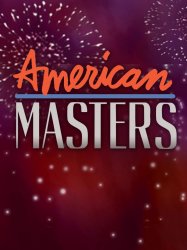
The Ten-Year Lunch (1987)
, 56minutesDirected by Aviva Slesin
Origin USA
Genres Documentary
Themes Films about writers, Documentary films about historical events, Documentaire sur une personnalité, Documentary films about cities
Actors Helen Hayes, Heywood Hale Broun, Ruth Gordon, Margalo Gillmore, Roberta Maxwell, Marshall Efron
Roles Himself (archive footage)
Rating65%





Le film retrace l'histoire de l'Algonquin Round Table, un groupe d'écrivains et d'acteurs à qui se réunissaient à l'Hôtel Algonquin à New York dans les années 1920, comprenant des personnalités telles que Dorothy Parker, Robert Benchley, George S. Kaufman, Edna Ferber, Marc Connelly, Harold Ross et Harpo Marx.
 , 2h13
, 2h13Directed by Gene Kelly
Origin USA
Genres Documentary, Musical
Themes Films about films, Films about music and musicians, Documentary films about business, Documentary films about the film industry, Documentary films about cities, Musical films, Documentary films about films
Actors Fred Astaire, Gene Kelly, Bud Abbott, Lou Costello, Lew Ayres, Stan Laurel
Roles (archive footage)
Rating72%





Gene Kelly et Fred Astaire présentent les meilleurs moments des films de la MGM.

The Bride Wore Boots (1946)
, 1h25Directed by Irving Pichel, Oscar Rudolph
Origin USA
Genres Comedy, Romantic comedy, Romance
Themes Films about animals, Sports films, Films about horses, Horse sports in film
Actors Barbara Stanwyck, Robert Cummings, Diana Lynn, Robert Benchley, Natalie Wood, Peggy Wood
Roles Uncle Todd Warren
Rating60%





Sally Warren runs a horse farm, but husband Jeff has a dislike and fear of horses. He is a Civil War historian and lecturer, which bores Sally but is very popular with local ladies who call themselves the Mason-Dixon Dames.

Road to Utopia (1946)
, 1h30Directed by Norman Panama, Hal Walker, Melvin Frank, Alvin Ganzer
Origin USA
Genres Comedy, Romantic comedy, Action, Adventure, Musical
Themes Films about films, Films about music and musicians, Transport films, Musical films, Road movies, Buddy films
Actors Bing Crosby, Bob Hope, Dorothy Lamour, Douglass Dumbrille, Hillary Brooke, Robert Benchley
Roles Narrator
Rating70%





After the credits we see Sal and Chester Hooton (Lamour and Hope), an old married couple. They are visited by an equally old Duke Johnson (Crosby), and the three reminisce about their previous adventure in the Klondike.
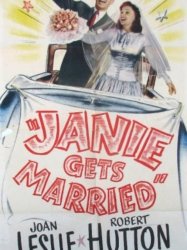
Janie Gets Married (1946)
, 1h29Directed by Vincent Sherman
Origin USA
Genres Comedy, Romantic comedy
Actors Joan Leslie, Robert Hutton, Edward Arnold, Ann Harding, Robert Benchley, Dorothy Malone
Roles John Van Brunt
Rating60%





Dick Lawrence revient de guerre dans sa bonne ville d'Hortonville. Il y retrouve sa mère Thelma, son beau-père John et surtout sa charmante petite amie Janie Conway, à laquelle il ne tarde pas à se fiancer puis à se marier. La jeune femme, qui trouve son époux encore trop peu adapté à la vie civile, va tout faire le réformer... en toute discrétion.

Duffy's Tavern (1945)
, 1h37Directed by Hal Walker
Origin USA
Genres Comedy, Musical
Themes Films about music and musicians, Musical films
Actors Bing Crosby, Betty Hutton, Ed Gardner, Paulette Goddard, Alan Ladd, Veronica Lake
Roles Robert Benchley
Rating58%





En 1945, aux Etats-Unis, un aubergiste et un patron de studio d'enregistrement recrutent des stars d'Hollywood pour qu'elles aident à renflouer leurs entreprises. Une adaptation d'un "Radio Show" très célèbre aux Etats-Unis composée de plusieurs sketches où apparaissent les stars fantastiques de la Paramount.
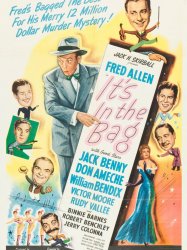
It's in the Bag! (1945)
, 1h27Directed by Richard Wallace
Origin USA
Genres Comedy
Actors Jack Benny, William Bendix, Don Ameche, Rudy Vallée, Jerry Colonna, Robert Benchley
Roles Parker
Rating66%





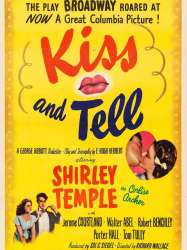
Kiss and Tell (1945)
, 1h30Directed by Richard Wallace, Earl Bellamy
Origin USA
Genres Comedy
Themes Films based on plays
Actors Shirley Temple, Jerome Courtland, Walter Abel, Katharine Alexander, Robert Benchley, Porter Hall
Roles George Archer
Rating64%





To boost sales and attract customers at the local bazaar, fifteen-year-old Corliss Archer and seventeen-year-old Mildred Pringle decide to start selling kisses.
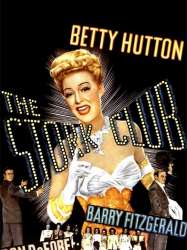
The Stork Club (1945)
, 1h38Directed by Hal Walker, Oscar Rudolph, Alvin Ganzer
Origin USA
Genres Comedy, Romantic comedy, Musical
Themes Films about music and musicians, Musical films
Actors Betty Hutton, Mae Busch, Barry Fitzgerald, Don DeFore, Andy Russell, Robert Benchley
Roles Tom P. Curtis
Rating63%





Judy Peabody saves an old man from drowning. He turns out to be Jerry Bates, "J.B." to his lawyer Curtis, "Pop" to Judy, who mistakenly believes the wealthy old-timer to be poor.
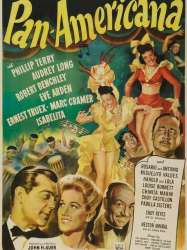
Pan-Americana (1945)
, 1h24Directed by John H. Auer
Origin USA
Genres Romantic comedy, Musical
Actors Phillip Terry, Audrey Long, Robert Benchley, Eve Arden, Ernest Truex, Jane Greer
Roles Charlie Corker
Rating54%






Duffy's Tavern (1945)
, 1h37Directed by Hal Walker
Origin USA
Genres Comedy, Musical
Actors Bing Crosby, Ed Gardner, Betty Hutton, Paulette Goddard, Alan Ladd, Dorothy Lamour
Roles Robert Benchley
Rating58%





En 1945, aux Etats-Unis, un aubergiste et un patron de studio d'enregistrement recrutent des stars d'Hollywood pour qu'elles aident à renflouer leurs entreprises. Une adaptation d'un "Radio Show" très célèbre aux Etats-Unis composée de plusieurs sketches où apparaissent les stars fantastiques de la Paramount.

Week-End at the Waldorf (1945)
, 2h10Directed by Robert Z. Leonard
Origin USA
Genres Drama, War, Comedy, Comedy-drama, Musical theatre, Musical, Romance
Themes Théâtre, Films based on plays
Actors Ginger Rogers, Lana Turner, Walter Pidgeon, Van Johnson, Edward Arnold, Keenan Wynn
Roles Randy Morton
Rating65%





The film focuses on various guests staying at New York City's famed Waldorf-Astoria Hotel. Among them are lonely screen star Irene Malvern, in town with her maid Anna for a childhood friend's wedding and the premiere of her latest movie; war correspondent Chip Collyer, mistaken for a jewel thief by Irene but playing along to catch her attention; flyer Capt. James Hollis, wounded in World War II and facing perilous surgery in three days; wealthy shyster Martin X. Edley, who is trying to sign the Bey of Aribajan to a shady oil deal; Oliver Webson, a cub reporter for Collier's Weekly hoping to expose Edley; and bride-to-be Cynthia Drew, whose upcoming wedding is endangered by her belief her fiancé Bob is in love with Irene Malvern. Also on the scene are Bunny Smith, the hotel's stenographer/notary public, who hopes to escape her low income roots by marrying Edley, and reporter Randy Morton, who loiters in the lobby hoping to stumble upon a scoop for his newspaper.
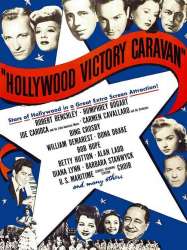
Hollywood Victory Caravan (1945)
, 19minutesDirected by William D. Russell
Origin USA
Genres Comedy, Musical
Themes Documentary films about war, Documentary films about historical events, Political films, Documentary films about World War II
Actors Robert Benchley, Humphrey Bogart, Bing Crosby, Bob Hope, Betty Hutton, Alan Ladd
Roles Robert Benchley
Rating59%





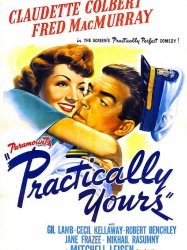
Practically Yours (1944)
, 1h30Directed by Mitchell Leisen
Origin USA
Genres Comedy, Romantic comedy, Romance
Actors Claudette Colbert, Fred MacMurray, Gil Lamb, Cecil Kellaway, Robert Benchley, Tom Powers
Roles Judge Robert Simpson
Rating60%





When a young pilot, Daniel Bellamy, is presumed dead after crashbombing an enemy aircraft carrier, the footage of the crash and his presumably final reminiscence of walking in the park with 'Piggy' and kissing her on the nose is sent back home. A typographical error in transcribing his words becomes a tribute to heroism, while a girl who worked in his office, Peggy, is thought to be the object of his secret love. However, Dan returns home and in order to save embarrassment for both the girl and himself, he tries to keep up the pretense. Dan reveals that he was not speaking of a girl, but in fact he meant his dog. A series of comical mishaps ensue, leading to resolution of the misunderstanding. The resolution, however, is long coming.
 Connection
Connection

